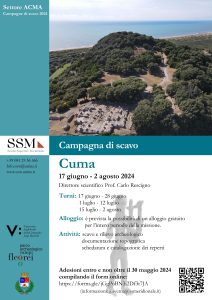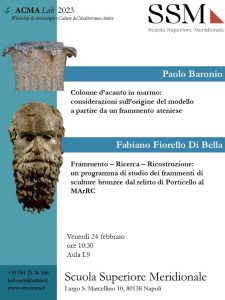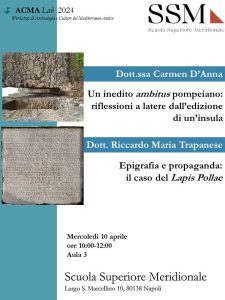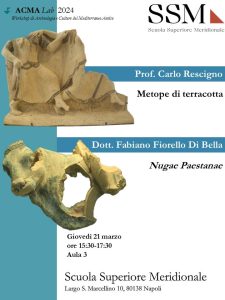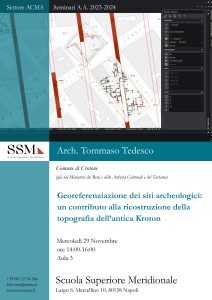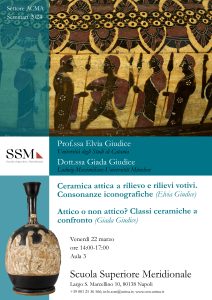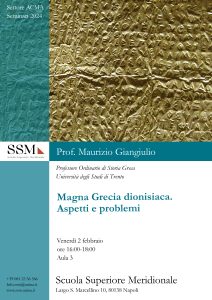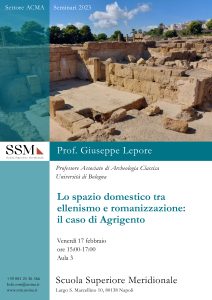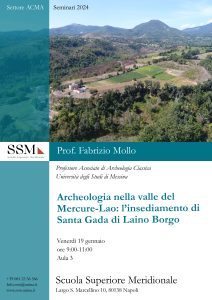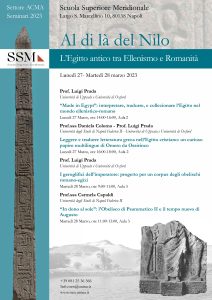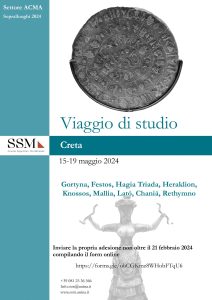Archaeology and Cultures of the Ancient Mediterranean (ACMA)
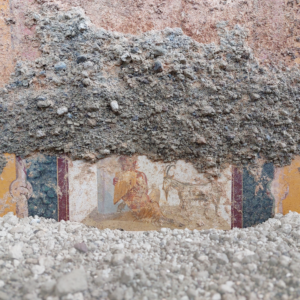 The PhD in Archaeology and Cultures of the Ancient Mediterranean. Historical Research, Conservation, Heritage Use consists of an advanced course of study and research based on a multi and interdisciplinary approach, at the end of which the student discusses a thesis based on original and independent scholarly work.
The PhD in Archaeology and Cultures of the Ancient Mediterranean. Historical Research, Conservation, Heritage Use consists of an advanced course of study and research based on a multi and interdisciplinary approach, at the end of which the student discusses a thesis based on original and independent scholarly work.
The focus of interest is archaeological heritage approached as a field of antiquities research, declined from historical and literary investigation to preservation, management and enjoyment.
The doctoral course aims to train students in the contextual reading and interpretation of cultural, social, economic and religious objects, spaces, practices and phenomena. This training is provided through case studies relevant to ancient Mediterranean civilizations and the management of their complex cultural heritage. Of particular relevance in the contemporary world are the issues of mobility of people, ideas, technologies and objects, the ‘hybridization of cultures and the practices of their connectivity. Objects, spaces, practices, and phenomena are also considered in their materiality in relation to their survival in the contemporary world and the necessary phenomena of manipulation, destruction, oblivion, rediscovery, presentation, and communication to which they are subjected.
The training model of the doctoral course is based on a balance of theoretical training, research and practical activity related to all the functions performed by a Superintendency and an Archaeological Museum in Italy, as well as by Museums and Territory administrations in particularly qualified foreign contexts.
A particular centrality is paid to Italy, both as a training site and as a case study, because of the high complexity of its cultural heritage that finds no parallels elsewhere and has generated specific know-how in research, management and conservation over the centuries. This centrality can profitably be supplemented for learners through experiences abroad, particularly in the aspects of public engagement, enhancement and vocational training.
The disciplines on which the members of its college can offer training and research preparation equal to the best international centers are: Archaeology; Prehistory and Protohistory; History of Classical Art; Ancient Near Eastern, Middle Eastern and ‘African Cultures; Latin Language and Literature; Greek Language and Literature; Ancient History; Restoration and History of Architecture; and Cultural Heritage Legislation.
The PhD in Archaeology and Cultures Of The Ancient Mediterranean. Historical Research, Conservation, Heritage Use is aimed at students holding a master’s degree (or equivalent) , who are highly motivated, have a solid personal background, diverse language skills and are eager to engage with multi and interdisciplinary approaches.
The doctoral program aims to train scholars who can contribute to the advancement of university research and teaching, as well as highly qualified professionals who can work in the field of protection, administration, enhancement and communication of archaeological heritage. The PhD in Archaeology and Cultures of the Ancient Mediterranean. Historical Research, Conservation, Heritage Enjoyment was established as an innovative doctorate with an interdisciplinary characterization and international vocation with the aim of attracting the best students and constantly involving in the teaching activity the leading international experts on the doctoral topics in addition to scholars working in foreign university sites that are part of the college.
It will be mandatory for each doctoral student to spend at least one year (even divided into several quarters or semesters) at foreign university and research institutions, archives and libraries.
The languages of the doctoral program are Italian and English; courses and seminars may be taught in either language.
The doctoral program aims to build a series of international partnerships through which to develop learner and faculty mobility. Current ties provide a relevant baseline.
Prof. Carlo Rescigno
University of Campania “L. Vanvitelli”
University of Naples Federico II
University College London
University of Naples Federico II
University of Naples Federico II
University of Naples Federico II
University of Paris 4 – Sorbonne
Egyptian Museum, Turin
University of Naples Federico II
Aarhus University
University of Campania “L. Vanvitelli”
University of Naples Federico II
Daniel Alessi
Ersilia Fiore
Fabrizio Martone
Oriana Pulcrano
Jaume Vilaró Fabregat
Lorenzo Toscano
Thomas Serafini
Antonia Viscusi
Francis Julian
Vincenzo Tallura
Salvatore Suarato
Ilaria Trafficante
Mariamafalda Crisci
Rosanna De Candia
Germano Germanò
Mariangela Giudice
Roberto Melfi
Luca Salvaggio
Rossana Caputo
Nicola Compagnone
Joseph Costanzo
Laura De Riso
Cyrus Donisio
Lucrezia Mastropietro
Francesca Paleari
Bianca Ambrose
Chiara Di Lello
Domenico Garzillo
Geneva Ghelli
Louis Montella
Alessio Russo Barone
Riccardo Maria Trapanese
Julia Valentine
Giuliana Vinciguerra
Educational activities are developed over four years of coursework. Teaching activities are concentrated in the first year of the course, while in the following three years students will be engaged in conducting research and periodically reporting on its progress both in individual interviews and in periodic seminar meetings.
Teaching activities are divided into compulsory courses with a final examination, seminar activities during which students can discuss specific aspects of doctoral work, lectures given by invitation by faculty members from outside the college, and activities in language and computer training, research management and the exploitation of its results.
The doctoral course can also be modulated for the purpose of organizing summer and winter schools aimed at students of graduate or doctoral schools in Italy and abroad.
Students are required during the first year to attend all activities, including extracurricular ones organized by the course.
The research and teaching topics are as follows (others may possibly be added to coincide with the research developments of the college members):
– Mobility of men and objects in the ancient Mediterranean
– Hybridization of cultures and practices of their connectivity
– Funeral ritual and the representation of the deceased in the written documents, architectural form, and figurative decoration of ancient Mediterranean civilizations
– Philological, linguistic, and critical-literary examination of the authors of Greek and Latin literature (8th B.C.-6th A.D.) and the forms of their contribution to historical-archaeological and historical-artistic analyses
– Philological, linguistic, and critical-literary examination of Latin and Greek language texts transmitted on media from archaeological excavations (texts on papyrus, on ostraka, on parchment fragments of archaeological provenance, on epigraphs, graffiti, and wall paintings)
– Management, enhancement and enjoyment of archaeological sites
– Myth and society in ancient Greece and Italy
– The role of shrines in the social, political and cultural life of the ancient city
– Workshops, workshops, artisans: from raw materials to the circulation of goods
– Originals and Copies: the seriality of the production process in Greek and Roman sculpture
– Maintenance and restoration in archaeological areas
– Biography of objects and materiality of the museum
– Communicating the ancient in the age of social media
First-year teaching activities are spread over two terms: November-January and March-June and are organized as follows:
Year I:
– 6 seminar courses (about 10 meetings of two hours each);
– 6 workshops (3 consecutive meetings);
– Active participation in conferences and seminars organized by the doctoral program or other university and research institutions;
– Preparation of an articulated research project for the transition to the 2nd year of the course.
Year II:
– Active participation in conferences and workshops organized by the doctoral program or other university and research institutions;
– 2 days of research progress presentation in the presence of mentors and the college;
– Research work to the thesis and preparation of a chapter.
Year III:
– Seminars presenting ongoing research in the presence of mentors and the college and active participation in conferences and workshops;
– Research work to the thesis and preparation of a chapter;
4th year:
– thesis completion.
The following activities are managed in concert with the other doctoral programs in the Southern High School
- Language courses: Courses are available at the university in Italian language for foreigners, as well as English, French, German, and Spanish.
- Computer skills: The School organizes short courses to train doctoral students in the critical use of digital resources and seminars to familiarize students with tools such as reference managers and spreadsheets.
- Management of research, knowledge of research systems and sources of funding: The School organizes training activities for in-depth study of how to manage research, including how to obtain funding. He also organizes meetings on writing research projects with ERC, FIRB and Fellowship winners abroad.
- Enhancement of Research Results and Intellectual Property: The School organizes activities for the in-depth study of the norms related to the enhancement and dissemination of scientific research, the protection of research results and authors, the protection of intellectual property, and the modalities of patenting in the national and international fields.
The research activity is carried out by each doctoral student under the supervision of a thesis director chosen from among the members of the College. The dissertation director designated by the college will be able to be joined by a second dissertation director chosen either from within or outside the college possibly also by activating the institution of co-tutorship by agreement.
The transition from the first year to the second year will be decided on the basis of the presentation of an articulated research project including a three-year work plan discussed in an interview attended for each doctoral student by at least three members of the college, who may ask the doctoral students, in addition to the discussion of the project itself and the papers they have prepared for the seminar courses they have taken, to read a bibliography relevant to their future research.
The transition from the second to the third year will take place on the basis of the discussion and approval of an indicative but detailed outline of the thesis that the doctoral student proposes to write and a chapter.
The transition from the third to the fourth year will take place on the basis of the presentation and discussion, and then approval by the thesis director, of an additional thesis chapter and a detailed table of contents.
Major international universities and research centers with which the college maintains research collaborations:
- Deutsches Archäologisches Instituts, Zentrale Berlin, Germany
- École Pratique des Hautes Études, Paris-France
- Cyclades Ephoria, Greece
- Institut de Recherche sur l’Architecture Antique, France
In addition, agreements for internships and apprenticeships are in place with the following entities of the Ministry of Cultural Heritage and Activities
– Archaeological Park of Pompeii
– Archaeological Park of Herculaneum
– Paestum Archaeological Park
– Campi Flegrei Archaeological Park
– Colosseum Archaeological Park
– National Archaeological Museum of Naples
– Egyptian Museum, Turin
– Salinas Museum, Palermo
Every month, starting June 2021, faculty, researchers and doctoral students from the Ancient Mediterranean Archaeology and Cultures area of the Southern High School will organize a space for reflection on ongoing research and projects.
A common time for discussion and debate where everyone has the opportunity to present ideas and activities in progress, receiving immediate feedback, criticism, suggestions.
An opportunity to cement the ACMA area working group, and to create a true scientific community, where everyone can be perpetually updated and feel an active part of a true workshop of ideas.
The periodic meetings:
one meeting per month is planned, in a classroom to be determined, with the possibility of remote connection, lasting 120 minutes. Each speaker will have no more than 20 minutes to present his or her research; the next 40 minutes will be devoted to scientific discussion.
The ACMA area periodically welcomes faculty and scholars for moments of reflection and updating on the most important ongoing projects in the field of Ancient Mediterranean Archaeology and Cultures.
March 2023: Athens and Olympia
July 1/2, 2021: Cumae and Stabiae
Course Duration: 4 years
Scholarships:Each year SSM puts up for competition 6 scholarships of €19,000 each.
Each fellowship is supplemented by additional funds for research activities in Italy and abroad.

